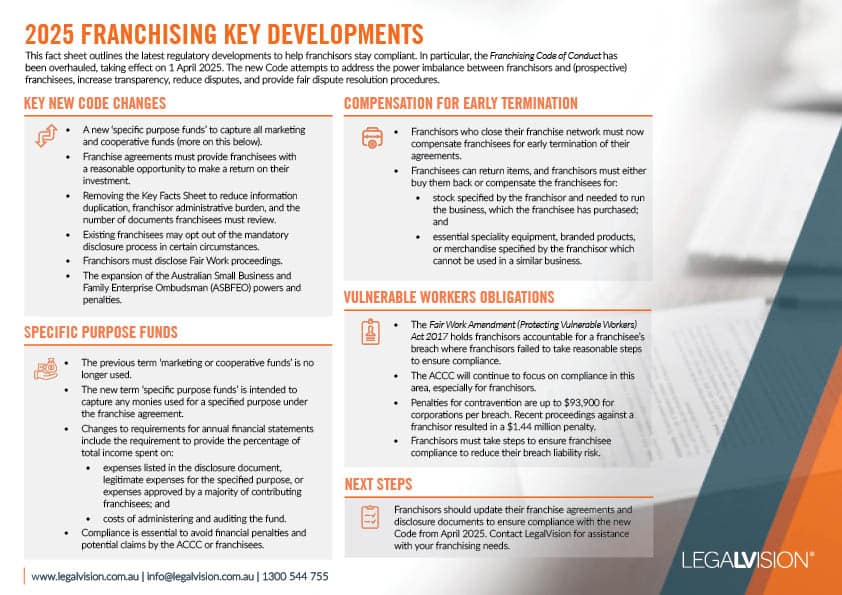In Short
-
Franchises offer brand recognition and support: Franchises provide an established brand, proven systems, and ongoing training, reducing the risk for new business owners.
-
Independent businesses allow full control: Starting your own business offers complete autonomy over branding, operations, and decision-making, but comes with higher risk and responsibility.
-
Consider your goals and resources: Choose a franchise if you prefer structure and support; opt for an independent business if you value freedom and have a clear vision.
Tips for Businesses
When deciding between a franchise and an independent business, assess your experience, risk tolerance, and desire for control. Franchises suit those seeking guidance and a proven model, while independent businesses are ideal for entrepreneurs wanting full creative and operational freedom. Carefully evaluate your goals and resources before making a choice.
When embarking on your entrepreneurial journey, one of the most crucial decisions you’ll face is choosing between a franchise and an independent business. Both structures offer unique advantages and challenges, and the right choice depends on your personal goals, skills, and circumstances. This article will explore the key differences between franchises and independent businesses to help you determine which option aligns best with your entrepreneurial vision.

Understand the latest regulatory developments to help franchisors stay compliant. Download our free factsheet today.
Understanding Franchises
A franchise is a business model in which an established company, known as the franchisor, grants an individual or entity, referred to as the franchisee, the right to operate a business under its brand name, systems, and processes. The franchisee pays an initial fee and ongoing royalties in exchange for the right to use the franchisor’s trademark, business model, and support systems.
Advantages of Franchising
- Established Brand Recognition: Franchises come with a pre-existing customer base and brand awareness, which can significantly reduce marketing efforts and costs.
- Proven Business Model: Franchisees benefit from a tried-and-tested business system, reducing the risk of failure compared to starting from scratch.
- Training and Support: Franchisors typically provide comprehensive training and ongoing support in areas such as operations, marketing, and financial management.
- Economies of Scale: Franchisees often enjoy bulk purchasing power and cost savings through the franchisor’s established supply chain.
- Easier Financing: Banks may be more willing to lend to franchisees due to the perceived lower risk associated with established brands.
Disadvantages of Franchising
- High Initial Costs: Franchise fees, royalties, and other startup costs can be substantial, potentially making the initial investment higher than starting an independent business.
- Limited Creative Control: Franchisees must adhere to the franchisor’s established systems and protocols, which can limit creativity and innovation.
- Ongoing Fees: Regular royalty payments can impact profitability, especially during challenging economic times.
- Contractual Obligations: Franchise agreements often include strict terms and conditions that may be difficult to navigate or terminate.
- Reputation Dependency: The success of your franchise can be affected by the actions of other franchisees or the franchisor, potentially impacting your business through no fault of your own.
Understanding Independent Businesses
An independent business is a venture that you start, own, and operate without the backing of an established brand or system. You have complete control over all aspects of the business, from its concept and branding to its operations and growth strategy.
Advantages of Independent Businesses
- Complete Autonomy: As an independent business owner, you have full control over all decisions, allowing for greater flexibility and creativity.
- Higher Profit Potential: Without franchise fees and royalties, independent businesses may have the opportunity for higher profit margins.
- Building Your Own Brand: You have the freedom to create and shape your brand identity from the ground up.
- Flexibility in Operations: Independent businesses can quickly adapt to market changes and local conditions without seeking approval from a parent company.
- Personal Satisfaction: Many entrepreneurs find greater fulfilment in building something entirely their own.
Disadvantages of Independent Businesses
- Higher Risk: Without a proven business model, independent businesses face a higher risk of failure, especially in the early stages.
- Limited Support: Independent business owners must navigate challenges without the backing of an established support system.
- Brand Building Challenges: Creating brand awareness and attracting customers from scratch can be a time-consuming and expensive process.
- Steeper Learning Curve: You’ll need to develop all aspects of the business yourself, which can be overwhelming for first-time entrepreneurs.
- Potential for Isolation: Running an independent business can be a solitary experience, lacking the network and community often found in franchise systems.
Making Your Decision
To determine which structure suits you best, consider the following factors:
- Financial Resources: Assess your available capital and risk tolerance. Franchises often require higher initial investments but may offer more financial stability.
- Experience and Skills: Evaluate your business acumen and industry knowledge. If you’re new to entrepreneurship, a franchise’s support system might be beneficial.
- Personal Goals: Reflect on your long-term objectives. Do you value creative freedom and building something from the ground up, or do you prefer a more structured approach with established systems?
- Industry and Market Research: Investigate the market potential for both franchise opportunities and your independent business idea in your target location.
- Work-Life Balance: Consider the time commitment required for each option. Franchises may offer more predictable hours, while independent businesses often demand more time, especially in the early stages.
- Exit Strategy: Consider your long-term objectives. Franchises may have restrictions on selling or transferring the business, while independent businesses offer more flexibility in exit options.
Legal Considerations
Regardless of which structure you choose, it’s crucial to understand the legal implications:
- for franchises, carefully review the Franchise Agreement and Disclosure Document. These documents outline your rights, obligations, and restrictions as a franchisee. These documents will also likely differ between franchisors, so it will be important that you carefully consider which franchise to move forward with; and
- independent business owners should consider the most appropriate business structure (e.g., sole trader, partnership, or company) and ensure compliance with all relevant regulations and licensing requirements.
In both cases, seeking professional legal advice is highly recommended to navigate the complexities of business ownership and protect your interests.
Key Takeaways
Choosing between a franchise and an independent business is a crucial decision that will significantly impact your entrepreneurial journey. While franchises offer the security of a proven system and brand recognition, independent businesses provide greater autonomy and potential for innovation. By carefully considering your personal goals, financial situation, and risk tolerance, you can make an informed decision that aligns with your vision for success.
If you have any further questions regarding business structures, our experienced business lawyers can assist as part of our LegalVision membership. For a low monthly fee, you will have unlimited access to lawyers to answer your questions and draft and review your documents. Call us today on 1300 544 755 or visit our membership page.
Frequently Asked Questions
Are franchises easier to finance than independent businesses?
Often, yes. Banks may view franchises as lower-risk due to their track record and brand recognition, making it easier to secure finance compared to a new independent business.
Which option gives me more freedom as a business owner?
Independent businesses offer more creative and operational freedom, while franchises require adherence to established systems and rules set by the franchisor.
We appreciate your feedback – your submission has been successfully received.












